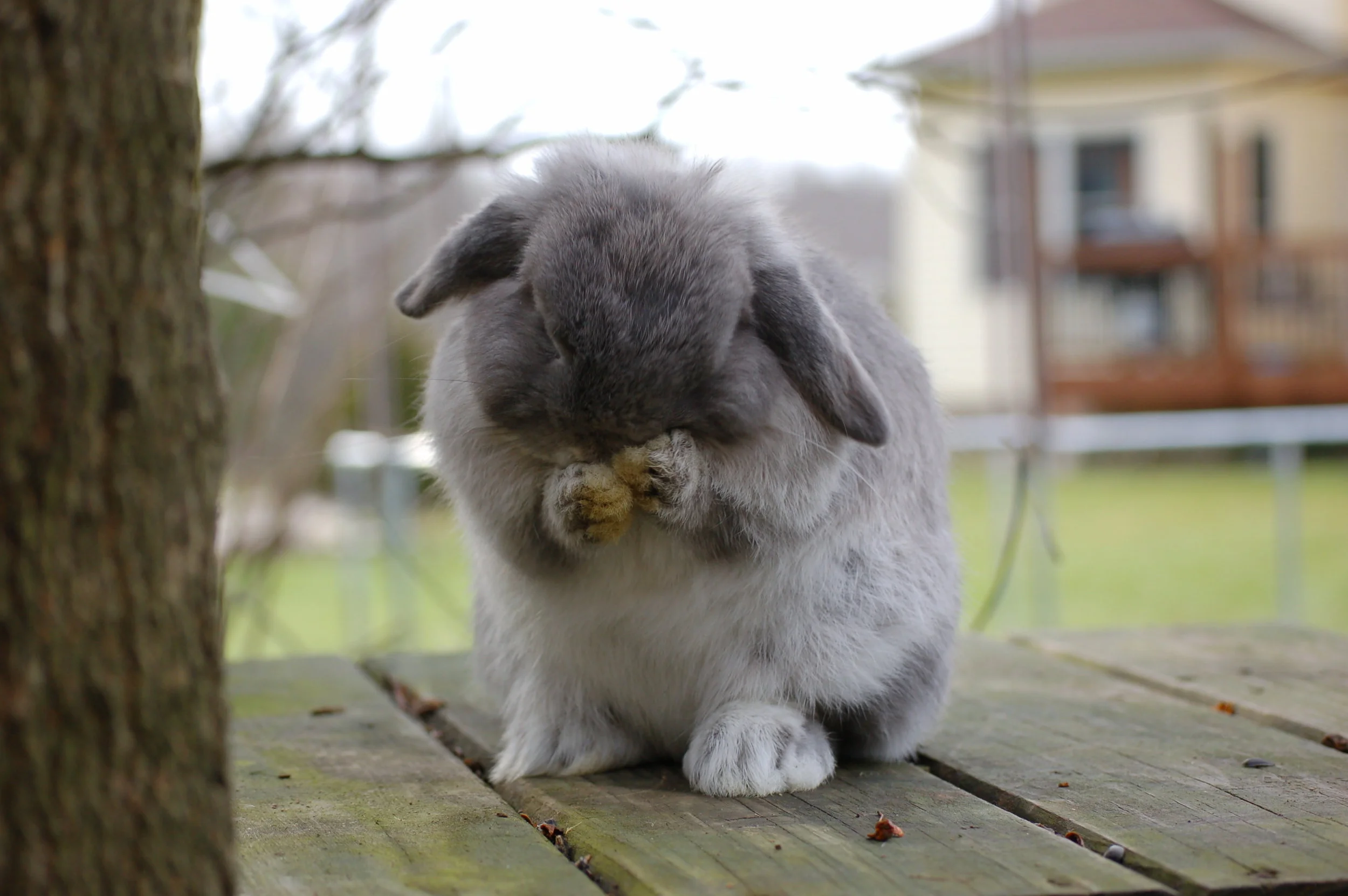Winning Over the Shy Bunny
For the sake of clarity, let me define the shy bunny as a bunny that is slow to warm up to it's new family. Do not confuse this with the introverted bunny - that's a whole different thing. Here are some common behaviors of the shy bunny:
* Likes to hide, but isn't necessarily scared.
* Resists being held.
* Is hesitant to move towards you when called.
* Doesn't seem to fully relax around you or your family.
If this is true of your bunny, it is most likely in a state of indecision. It prefers to stay in a position of control over it's own destiny. This is because it hasn't fully bought into you or your family as beneficial or safe. It DOESN'T mean that your bunny is at odds with you. At this point, you just need to engage in a few behaviors that will swing the popularity vote in your direction.
1. Make sure you consistently follow a daily routine for your bunny. Bunnies are creatures of habit. There is no such thing as TOO predictable for a bunny. Nothing would please your bunny more than being able to count on any of the following: morning feeding time, an exercise time, a greeting when you come home, a treat time, a petting time, a second feeding time, a cleaning schedule, etc - that happen at the same time every day. How can you reassure your bunny that the world may fall apart, but the bunny schedule will remain the same? Consistent execution of the schedule day after day after day.
2. You may need to train your bunny to associate YOU with GOOD. This is mostly because doing things with you often requires that your bunny feel vulnerable (being picked up, being held, having it's nails cut, etc.) Help your bunny realize that it is safe with you and that time with you always means a reward. It's important to clarify here that a reward can be more time out, a bigger space to run, being pet, some dandelion, a new toy, playing with you, banana, etc. How does this actually play out? Let's look at a basic - your bunny not wanting to be picked up and held.
* Even if your bunny doesn't want to be picked up, pick it up and hold it in your lap for five minutes at a time, once or twice a day.
* During that time, pet your bunny, talk to it, and be cheerful (no matter how upset your bunny seems to be). It's really important for your bunny to know that you are predictably kind and firm, no matter how it acts.
*Then end your time with a treat and the opportunity for your bunny to regroup and be independently on it's own - whether in it's hutch or a play space. It sends a message to your bunny that it is still in control of itself, that you respect it's space and need for a little autonomy, and that picking you, doesn't mean being out of control.
* Slowly extend the length of time that your bunny stays on your lap. If you do this consistently, your bunny will eventually relax because it knows the routine - sit in lap, get pet, get treat. You might even end up with a visitor every time you sit down.
3. Give your bunny space, but lure them out. Did you ever babysit? Remember the first time on a job when there was that awkward warm-up time where the kids were shy and avoided you like the plague? Yeah, it's just like that with your bunny. You didn't win over the toddler by forcing him into a game of chutes and ladders. You pulled out a funny book with great pictures and started reading out loud, or you did an elaborate narration as you ineptly constructed a tower and wondered out loud if anyone anywhere could show you how to do it right. Do the same kind of thing for your bunny.
* Lay on the floor so you are less intimidating.
*Put a trail of oats from your bunny to you.
*Wait, or even better, read a magazine or book and ignore your bunny. (this can backfire as I have had many a bunny stand on my books and try to eat the pages to get my attention)
Give your bunny the opportunity to come to you on it's own volition. Once you get to this point a few times, you can be sure that you are gaining ground.
4. Watch your bunny. Be Sherlock Holmes for a little bit. Does your bunny act stressed around certain animals, people, sounds, etc? Does it avoid certain pieces of furniture or areas? Find the pattern, and you can fix the problem. Try to eliminate the stressors and increase the things that make it feel safe and good.
5. Deal with bad behavior correctly. Sometimes when a bunny feels insecure, or goes through a situation where it temporarily lose some independence (like cutting nails, or when you move it's stuff to clean the cage), it can get snarky. It might lunge at you, nip you, grunt, hold a grudge, ignore you, etc. Please do not respond with water in it's face, a smack, or screaming. That moves from dealing with behavior to fostering fear - which can eventually ruin your relationship past repair. From my experience, this is the best way to handle it:
* Try to be quick on your feet and head off the nip before it happens, or just react very quickly, and gently. Firmly press your bunny's head to the ground, into a submissive posture. Then clearly and firmly say, "No! No biting!" Immediately put your bunny back in it's hutch and close the door. If you are thinking it's a time out - it is.
*If the behavior is negative, but not aggressive, just ignore it. Think of this as a variation on the silent treatment. Your bunny needs to find out that it's bad attitude does not AFFECT you. Your bunny can hold a grudge, but you will just keep doing what you always do - care for and love it. This will melt your bunny's resolve and it will likely forget whatever offended it. This does not look like smothering your bunny with love while it hates on you. It looks like your bunny's best efforts at revenge are useless in altering your behavior.
If you have any additional questions, feel free to email us at hickoryridgehollands@gmail.com!


